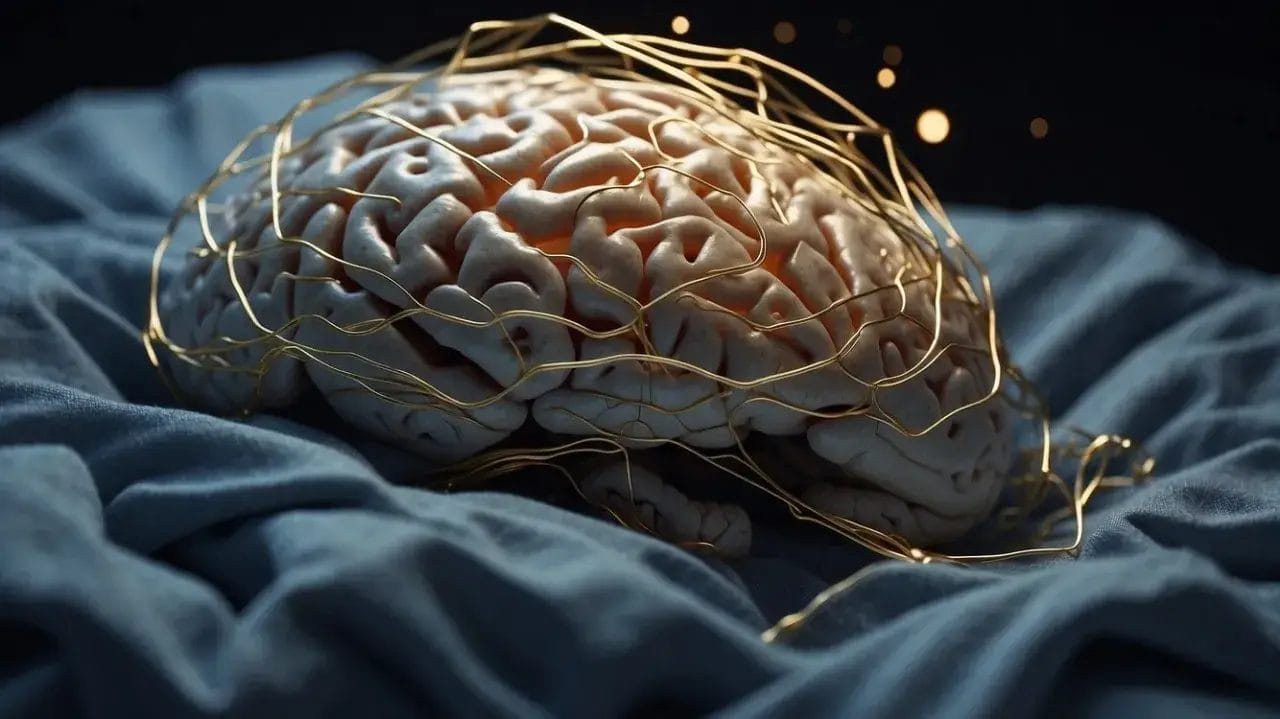Connection Between Snoring and Memory Loss: New Study Reveals Surprising Link
Snoring might seem like a harmless habit, but it could be a sign of something more serious. Many people don’t know that snoring can be linked to memory problems. This connection is important to understand, as it affects your health and well-being.
Studies have found that people with sleep apnea, a condition often marked by loud snoring, may face a higher risk of memory and thinking issues. Sleep apnea causes brief pauses in breathing during sleep, which can happen many times each night. These pauses can disrupt your sleep quality and may harm your brain over time.
You might wonder how snoring could affect your memory. When you snore, you may not get enough oxygen to your brain. This lack of oxygen can damage brain cells and lead to memory problems. It’s not just about feeling tired the next day – the effects could last much longer.
Key Takeaways
- Snoring and sleep apnea can increase your risk of memory and thinking problems
- Poor sleep quality from snoring may lead to brain cell damage over time
- Getting your snoring checked by a doctor can help protect your brain health
Snoring And Sleep Apnea
Snoring and sleep apnea are closely linked breathing issues that can disrupt sleep. These conditions often go hand-in-hand and can have serious effects on your health and memory.
Definition of Obstructive Sleep Apnea (OSA) And Its Symptoms
Obstructive Sleep Apnea (OSA) is a sleep disorder where your breathing stops and starts repeatedly during sleep. It happens when your throat muscles relax and block your airway.
Common symptoms of OSA include:
- Loud snoring
- Gasping for air during sleep
- Waking up with a dry mouth
- Morning headaches
- Daytime sleepiness
- Trouble concentrating
If you have these symptoms, it’s important to talk to your doctor. OSA can lead to serious health problems if left untreated.

The Prevalence of Snoring in Individuals With Sleep Apnea
Snoring is very common in people with sleep apnea. Almost everyone with sleep apnea snores, but not all snorers have sleep apnea.
Studies show that about 50% of loud snorers have sleep apnea. If you snore loudly and often, you might want to get checked for sleep apnea.
Your bed partner can help by noting if you stop breathing during sleep. This is a key sign of sleep apnea.
Impact of Sleep Apnea on Memory
Sleep apnea can harm your memory in several ways. When you stop breathing, your brain doesn’t get enough oxygen. This can damage brain cells over time.
Research links sleep apnea to a higher risk of memory problems. People with sleep apnea may have a 50% higher chance of memory issues.
Sleep apnea also disrupts your sleep cycles. This can stop your brain from properly storing memories. You might have trouble remembering things or concentrating during the day.
A study found that sleep apnea can shrink parts of the brain linked to memory. This shows how important it is to treat sleep apnea early.
The Link Between Sleep Quality And Brain Health
Sleep quality has a big impact on how well your brain works. Good sleep helps your memory and thinking. Poor sleep can hurt your brain health over time.
Connection Between Sleep Disturbances And Cognitive Function
Sleep problems can affect how your brain works. Not sleeping well makes it harder to focus and remember things. You may have trouble learning new info or solving problems.
Snoring and sleep apnea are two common sleep issues. They can stop you from getting deep sleep. This may lead to fuzzy thinking during the day.
Your brain needs good sleep to work right. While you rest, your brain sorts through memories. It keeps the important ones and gets rid of what you don’t need.
Association Between Sleep And Dementia
Poor sleep may raise your risk for dementia later in life. Studies show a link between sleep problems and Alzheimer’s disease.
Not getting enough sleep can cause harmful proteins to build up in your brain. These proteins are linked to memory loss and confusion.
Sleep apnea seems to be extra risky. It may speed up memory decline in older adults. Getting your sleep apnea treated could help protect your brain.

Changes in Brain Areas Related to Alzheimer’s Disease Due to Insufficient Sleep
Lack of sleep can harm parts of your brain linked to Alzheimer’s. Your brain has a system that cleans out waste while you sleep. When you don’t sleep enough, this system can’t do its job.
Research shows that poor sleep leads to more of a protein called beta-amyloid in your brain. This protein is found in the brains of people with Alzheimer’s.
Not sleeping well can also shrink parts of your brain over time. These are areas key for memory and thinking. Getting good sleep may help keep your brain healthy as you age.
Cardiometabolic Conditions And Their Role In Cognitive Decline
Sleep apnea is linked to several cardiometabolic conditions that can impact brain health. These conditions play a key role in increasing the risk of cognitive decline and dementia over time.
Overview of Cardiometabolic Conditions Associated With Sleep Apnea
Sleep-related symptoms like snoring are often tied to cardiometabolic disorders. The main conditions include:
- Obesity
- High blood pressure
- Type 2 diabetes
- High cholesterol
These issues can develop due to the frequent sleep disruptions and low oxygen levels caused by sleep apnea. Your body experiences stress each time breathing stops, leading to inflammation and hormonal changes.
Obesity is especially common, as sleep apnea can disrupt appetite hormones. This makes weight gain more likely, creating a cycle that worsens both conditions over time.
Examination of How These Conditions Contribute to Dementia Risk
Cardiometabolic disorders can harm your brain health in several ways:
- Reduced blood flow to the brain
- Chronic inflammation
- Insulin resistance
- Damage to blood vessels
These effects can lead to changes in brain structure and function. Over time, they may speed up cognitive decline and raise your risk of dementia.
High blood pressure is a key factor. It can damage small blood vessels in the brain, leading to silent strokes and white matter changes. These issues can affect memory, thinking speed, and other mental skills.

Signs And Symptoms Of Sleep Apnea
Sleep apnea has many signs beyond just loud snoring. You might notice daytime tiredness, morning headaches, or mood changes. Some symptoms can be surprising and easy to miss.
Common Indicators of Sleep Apnea Beyond Snoring
You may wake up with a dry mouth or sore throat. This happens because sleep apnea often causes mouth breathing. Memory problems and trouble concentrating can also occur due to poor sleep quality.
Nighttime symptoms include:
- Gasping or choking during sleep
- Restless sleep or insomnia
- Frequent trips to the bathroom
Daytime signs to watch for:
- Excessive sleepiness
- Irritability or mood swings
- High blood pressure
You might also notice a decrease in libido or sexual function. This is linked to the hormonal changes caused by poor sleep.
Five Weird Signs of Sleep Apnea
- Teeth grinding: You may wake up with jaw pain or worn tooth enamel.
- Nighttime sweating: Struggling to breathe can cause you to sweat more than usual.
- Weight gain: Sleep apnea can affect your metabolism and lead to unexpected weight gain.
- Frequent nightmares: Disrupted sleep can increase vivid or disturbing dreams.
- Morning nausea: The effort of breathing during sleep can cause stomach acid to rise, leading to nausea upon waking.
These unusual symptoms can be easy to miss or blame on other causes. If you notice any of these signs, it’s worth talking to your doctor about the possibility of sleep apnea.
Effects Of Snoring On Relationships And Mental Health
Snoring can strain relationships and harm mental well-being. It disrupts sleep for both partners and may lead to mood issues, daytime fatigue, and cognitive problems.

How Heavy Snoring Can Impact Interpersonal Relationships
Snoring can put a serious strain on couples. It often forces partners to sleep in separate rooms, reducing intimacy and closeness. This physical separation can hurt relationships over time.
You may feel guilty about keeping your partner awake. Your partner might feel resentful about lost sleep. These negative emotions can lead to more arguments and tension.
Snoring can also affect your social life. You may avoid trips or sleepovers with friends out of embarrassment. This isolation can damage friendships and support networks.
Psychological Implications of Sleep Disturbances on Mood And Cognitive Function
Poor sleep from snoring can seriously impact your mental health. You may experience:
- Irritability and mood swings
- Difficulty concentrating
- Memory problems
- Increased anxiety or depression
Chronic oxygen deprivation from sleep apnea can worsen these issues. It may lead to cognitive decline over time.
Daytime fatigue from disrupted sleep can affect your work performance. You might struggle to focus or make decisions. This can increase stress and harm your self-esteem.
Seeking treatment for snoring is key. It can improve your sleep quality, relationships, and overall mental well-being.
Strategies For Alleviating Snoring And Sleep Apnea
You can take steps to reduce snoring and sleep apnea. Simple changes to your habits and lifestyle often help. Medical treatments are also available for more serious cases.
Lifestyle Changes That Can Reduce Snoring
Losing weight can make a big difference. Extra weight puts pressure on your airways. Even a small amount of weight loss may help you snore less.
Change your sleep position. Sleeping on your side instead of your back can open up your airways.
Avoid alcohol before bed. It relaxes your throat muscles, which can make snoring worse.
Stop smoking. Smoking irritates your airways and can worsen snoring.
Use a humidifier in your bedroom. Dry air can irritate your nose and throat.
Exercise regularly. It can help you lose weight and tone your throat muscles.
Medical Interventions for Obstructive Sleep Apnea
CPAP machines are often used to treat sleep apnea. They keep your airway open while you sleep.
Oral appliances can help. These devices move your jaw forward to open your airway.
Surgery is an option in some cases. It can remove excess tissue in your throat.
Nasal strips or dilators may help. They can open your nasal passages to improve airflow.
Ask your doctor about new treatments. Implanted devices that stimulate nerves in your airway are now available.
How to Stop Snoring And Reduce Your Dementia Risk
Regular sleep is key for brain health. Aim for 7-9 hours of quality sleep each night.
Treat sleep apnea if you have it. Untreated sleep apnea may increase your risk of memory problems.
Keep your mind active. Do puzzles, read, or learn new skills to keep your brain sharp.
Exercise your body and your brain. Physical activity can improve sleep quality and brain health.
Eat a healthy diet. Foods rich in omega-3 fatty acids and antioxidants may help protect your brain.
Get regular check-ups. Your doctor can monitor your sleep health and cognitive function.
Conclusion
Snoring can be more than just a nuisance. It might point to a serious health issue called sleep apnea. This condition can affect your memory and thinking skills.
If you snore often, it’s important to talk to your doctor. They can check if you have sleep apnea. Getting treatment for sleep apnea may help protect your memory and brain health.
Remember, good sleep is crucial for your brain. It helps you form and keep memories. By taking care of your sleep, you’re also taking care of your mind.
Don’t ignore snoring or memory problems. They could be connected. Seek help if you’re worried. Your brain health is worth it.
With the right care, you can improve your sleep and potentially boost your memory. Take action now to safeguard your cognitive health for the future.
References
Here are some key sources on the connection between snoring and memory loss:
- Role of normal sleep and sleep apnea in human memory processing
- Obstructive Sleep Apnea and Cognitive Decline
- Obstructive sleep apnea, cognition and Alzheimer’s disease
You can find more information on how sleep apnea may affect memory at the Cleveland Clinic website.
For a summary of recent research on sleep apnea symptoms and memory issues, check out this Medical News Today article.
These references provide scientific studies and expert insights on the topic. You can explore them to learn more about the potential links between snoring, sleep apnea, and cognitive function.
Frequently Asked Questions
Sleep disorders and breathing issues during sleep can impact memory and brain health. These questions address common concerns about the links between sleep problems and cognitive function.


